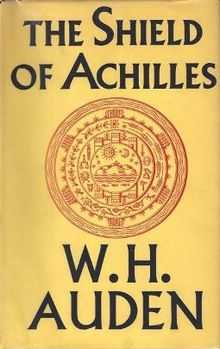The Shield of Achilles
- The article is about poems by W. H. Auden. For the actual object, see Shield of Achilles.

"The Shield of Achilles" is a poem by W. H. Auden first published in 1952. The Shield of Achilles is also the title poem of a collection of poems by Auden, published in 1955.
Description
The poem is Auden's response to the detailed description, or ekphrasis, in Homer's epic poem the Iliad of the shield borne by the hero Achilles, illustrated with scenes from daily life.
Auden's poem is written in two different stanza forms, one form with shorter lines, the other with longer lines. The stanzas with shorter lines describe the making of the shield by the god Hephaestus, and report the scenes that Achilles'mother, the Nereid Thetis, expects to find on the shield and which Hephaestus, in Auden's version, does not make. Thetis expects to find scenes of happiness and peace like those described by Homer.
The stanzas with longer lines describe the scenes that Hephaestus creates in Auden's version, scenes of a barren and impersonal modern world. In the first, an anonymous, dispassionate army listens while a crowd of ordinary people watch passively. In the third scene, a "ragged urchin" throws a stone at a bird; he takes it for granted "that girls are raped, that two boys knife a third," and "has never heard of any world where promises are kept / Or one could weep because another wept."
In the closing stanza in short lines, Thetis cries out in dismay at what Hephaestus has made for her son, "who would not live long."
The poem is frequently cited as an antiwar poem, but it is also a study in language and responsibility: both Thetis and Hephaestus act on behalf of someone else, Achilles, and they take no personal responsibility for the results. And the results of their passive, impersonal stance is the passive, impersonal world portrayed on the shield.
An alternative reading: Auden reflects bitterly on the differences between the Achaean world as described by Homer—a world where, even amid warfare, imagination naturally ran to scenes of peace—and the world of totalitarian horror Auden himself imagines. At the same time, Auden criticizes Homer for attributing glory to warriors.
Auden's moral opprobrium is directed, not at Thetis or Hephaestus, but at "the strong iron-hearted man-slaying Achilles." The shield described by Auden is made by the god to please Achilles: the horrid world depicted there (and not the delightful world depicted in the shield described by Homer) is the natural result of the sort of iron-hearted manslaughter Achilles, and his comrades and rivals, practice.
Critical reception
Auden was disillusioned by the totalitarian state of the modern world which completely buried the growth of the individual. He felt that people existed as the 'State' and not as the 'Individual'. He therefore reflects the contrast between the modern world and the Achillean world. Auden deliberately interprets the images drawn on the shield to speak of the ills of the modern world.
Collection
The book The Shield of Achilles is a collection of poems in three parts, published in 1955, containing Auden's poems written from around 1951 through 1954. It begins with the sequence "Bucolics", then miscellaneous poems under the heading "In Sunshine and In Shade", then the sequence Horae Canonicae.
It won the U.S. National Book Award for Poetry in 1956.[1]
References
- ↑ "National Book Awards – 1956". National Book Foundation. Retrieved 2012-02-25.
(With acceptance speech by Auden and essay by Megan Snyder-Kamp from the Awards 60-year anniversary blog.)
- John Fuller, W. H. Auden: A Commentary (1999)
- Edward Mendelson, Later Auden (1999)
External links
| ||||||||||||||||||||||||||||||||||||||||||||||||||||||||||||||||||||||||||||||||